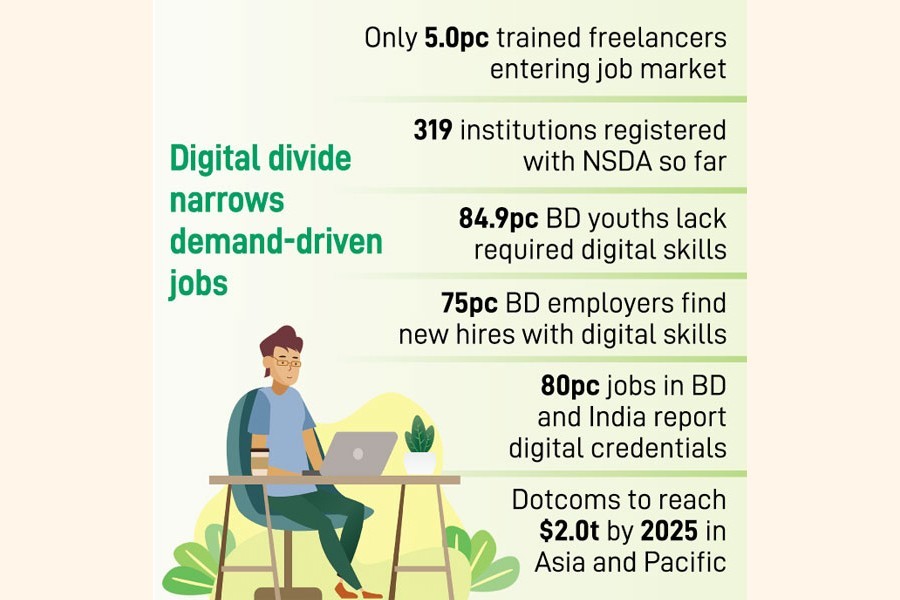Bangladesh has been in peril for not creating demand-driven employment opportunities mainly due to the absence of required digital skills and adequate policy support amid a widening digital divide.
The Education Commission and the UNICEF in their July-2022 report reveals that 84.9-per cent youth of the nation suffer a shortage of required digital skills.
An estimated 57.8 per cent are lacking in secondary-level skills needed for employment, it cites.
Bangladesh ranked 96th among 113 economies in digital environment and support systems for entrepreneurs, reflecting poor opportunities and lack of congenial atmosphere to thrive, cites the latest ADB report.
According to the International Data Corporation (IDC), digital technologies are greatly impacting production and consumption of goods and services.
It expects that 65 per cent of GDP in Asia and the Pacific will be digitised by 2022. By 2023, one in three companies will generate over 30 per cent of their revenue from digital products and services.
The ADB further cited that e-commerce is expected to reach $2.0 trillion by 2025 in Asia and the Pacific.
The newly-formulated National Employment Policy-2022 eyes an estimated 30-million fresh jobs by 2030 to keep the unemployment rate at its lowest level by 2041.
To achieve the sustainable development goals by 2030, Bangladesh needs to employ 1.84-million people each year while another 0.5-million outside the country.
Almost two-thirds or 64 per cent of surveyed online trainers in five countries, including Bangladesh, do not offer digital skill programmes that are packaged specifically for all disadvantaged youth, indigenous communities, and people in poverty in remote areas with no or little access to internet, according to the ADB-LinkedIn study.
About 70 per cent of all surveyed employers in five countries, including Bangladesh, reported that basic and applied digital skills are now a workplace necessity, highlighting the growing importance of advanced digital skills, it found.
With this phenomenon in view, experts and stakeholders suggest equal access to digital skills and credentials by disadvantaged segments.
According to the ADB, 80 per cent of all job applications in Bangladesh and India reported digital credentials.
Salekin, who is in his 35s and engaged in a low-paid job, said he was recently offered a lucrative job from China for having fluency in both English writing and speaking alongside video-editing.
Earlier, he failed to grab this opportunity as he lacked good proficiency in video-editing.
National Skills Development Authority (NSDA) started life in 2019 with an eye to steering and coordinating all skills development activities of the country.
Involving the youth in skills training through promoting skills activities is vital among other mandated functions, NSDA's former executive chairman Dulal Krishna Saha said.
All the institutions, both public and private, are needed to get registered with the NSDA in order to coordinate the tasks of provider institutions.
So far, 319 have been registered to date and 533 professionals in the assessor's pool, according to the NSDA.
Forty-seven assessment centres have already been accredited, 149 competency standards developed and 27 curriculum sets prepared.
NSDA member Dr Mohammad Ziauddin said cabinet division is now scrutinising the NSDA policy, which was earlier approved by its executive committee.
The formulation of the national action plan is nearing completion, he told the FE.
Admitting that a majority of the workforce lacks digital skills, Prof Dr Md Mahbubul Alam Joarder of the Institute of Information Technology at Dhaka University, said most students face hurdles in relating their long-term learning to the industry.
The academia-industry gap is still acute in the country that should be addressed immediately, he told the FE.
Mr Mahbub suggested that students be engaged with the industries concerned for a compulsory six-month internship to bridge the gap.
AKM Fahim Masroor, co-founder and CEO of bdjobs.com, said a good percentage of people, including the youth, in rural areas do not have access to digital devices like computers.
They are yet to have access to affordable broadband connectivity, although mobile data is easily accessible but very costly, he argued.
Citing government policies on skills development as time-befitting and industry-driven, Mr Masroor said only a disappointing 5.0 per cent of the freelancers, who received training through different projects, are entering the job market.
"Our country should count the number of employed people, but not the number of trainees," he added.
The government is investing wads of money in skills growth through different projects and institutes, but the outcome is inadequate and not visible, he observed.
Returns from this spending on skills development are poor as the government is still focusing on institute-based rather than industry-driven, Mr Masroor added.
Bangladesh House Building Finance Corporation chairman Prof Dr Md Salim Uddin said his organisation is also facing essential digital skill shortages in posts and positions like HR, finance and accounting.
To this effect, he said, the government should accelerate its skills development efforts through investing largely in schools and colleges, especially in rural areas.
Mr Salim observed that the clear-cut digital divide between rural and urban areas, which is primarily caused by income and wealth inequalities, should be closed and addressed immediately.
Post, telecoms and ICT minister Mustafa Jabbar said the ICT division under its policy framework is working relentlessly to accelerate skills growth initiatives.
The private sector has been playing a pivotal role for decades to this end, he told the FE, saying that its role would be substantial in the coming days.


